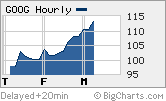NEW YORK (CNN/Money) -
Get ready for the Google wannabes.
On the heels of the top search engine's successful initial public offering last week, tech watchers are taking an interest in privately held search upstarts, companies with names like Dipsie, Eurekster, Quigo and Groxis.
"The Google IPO will have long coattails that people will try to jump on," said Danny Sullivan, editor of SearchEngineWatch.com. "Plenty of venture capitalists are running around looking for the next Google."
Despite Google's widely acknowledged technology prowess, there still is room for upstarts to make inroads.
Mark Mahaney, an analyst with American Technology Research, said that the next challenge will be to personalize Web searches, that is, make it easier for someone to quickly get a desired result without wading through pages of listings.
"Can you get better at finding what people are really looking for, based on either prior search traffic or something about their interests?" said Mahaney.
Your own personal search
Google does have a beta version for a personalized search engine. A user can click on various interests to yield more pertinent results.
For example, if you select several music categories and then search for "bass", you should get more results about say, Charlie Mingus and Jaco Pastorious, than fishing or Bass ale.
 |
|
| Google's IPO success will probably lead investors to seek out the next Google. |
But Eurekster's beta test of a similar product may have some advantages over Google's.
Eurekster saves search results (you need to register with an e-mail address to use the personalized aspect of the site) and lists previously viewed Web sites at the top of future search listings. You can also download a toolbar that can launch Eurekster searches from any site.
"It's all about relevance -- the more relevant results you can provide users, the more satisfied they will be," said Steven Marder, the president and chief operating officer of Eurekster.
In addition, if you have friends sign up for Eurekster and they search for the same topic as you, your results are ranked higher for them as well.
Moreover, Marder said that having a network of communities with specific interests will be more attractive to businesses looking to target specific ads.
Groxis is another company that is looking to take advantage of a need to make search results easier to navigate.
The difference in its model though is that Groxis sells software called Grokker (it costs $49) that scans through results from several different search engines (including Google, Yahoo! and Microsoft's MSN) at once and filters the results into different categories.
Trolling through the Deep Web
Another area that private companies are targeting is the so-called Deep Web.
While Google's search engine scans through an index of more than 4 billion Web pages, that's just a small fraction of the URLs on the Internet.
Chicago-based Dipsie, which by November hopes to launch a public beta test of its search engine, has a goal of being able to access an index of 10 billion web pages by next July.
| More about the search biz
|

|
|
|
|
Search technology company BrightPlanet has a search engine called CompletePlanet that scans through a database of more than 70,000 specialty search engines to access some pages not available through the more popular search engines. BrightPlanet also sells versions of its databases to corporate and government customers.
But will any of these private companies really be able to challenge the market leadership of Google, Yahoo! or MSN?
It's going to be an uphill battle. The allure of search-based advertising is no longer a secret.
"Search is such a competitive marketplace in a way that it was not when Google first launched," said Greg Sterling, an analyst with Kelsey Group, a research firm focused on search. "Companies will need to either make a radical leap forward with technology or spend a lot of money to build awareness."
Sterling adds that it's highly doubtful any of the private firms will be able to afford, or have the desire, to spend on major marketing campaigns.
M&A more likely than IPO
Sullivan said that if any of the private firms do wind up developing technology that could threaten one of the major players, they are more likely to get scooped up as opposed to going public. "It's a crowded market. If other companies get popular they would get purchased," he said.
Dipsie's founder, Jason Wiener, said he wouldn't rule out a sale of the company. Eurekster's Marder said he expects more consolidation within search but hopes to remain independent. But he added that he hopes to partner with the search giants.
And in an acknowledgment of how tough it will be to supplant the market leaders, some are turning to search optimization tools that will help Web publishers get their results listed on popular search engines like Google and Yahoo!
One company called Quigo unveiled a Deep Web search engine called Flipper a few years ago but is now focusing mainly on selling tools to advertisers and publishers instead. Dipsie is also planning to use its technology in similar products.
"We're not looking to knock someone off a hill but make everyone's life better. Instead of being competitive to Google, we're complimentary to Google," said Wiener.
So rather than trying to become the next Google or Yahoo!, Sullivan expects most private search companies to try and piggyback off their success.
"It's difficult to kill somebody that you're dependent on," quips Sullivan.
Analysts quoted in this story do not own shares of companies mentioned and their firms have no banking ties to the companies.

|

